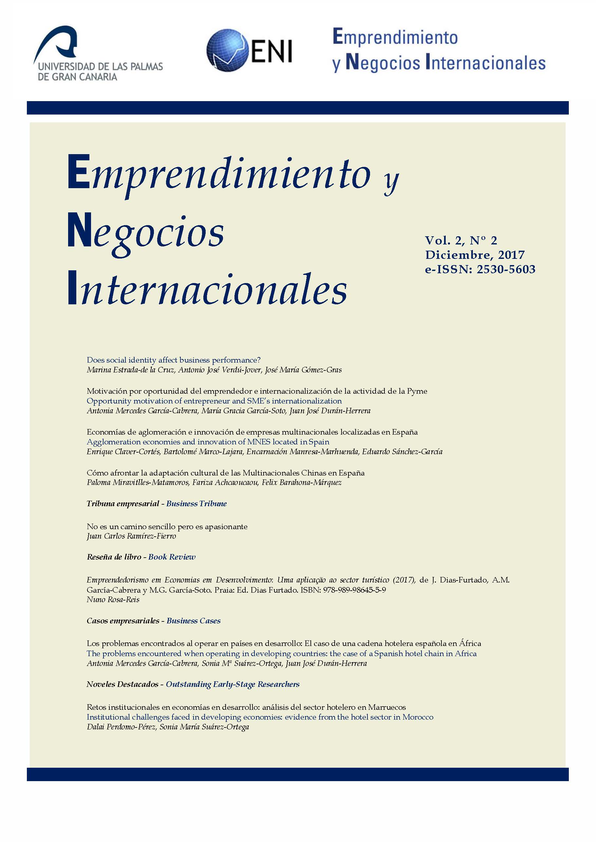Motivación por oportunidad del emprendedor e internacionalización de la actividad de la Pyme / Opportunity motivation of entrepreneur and SME’s internationalization
Resumen
¿Condiciona la motivación emprendedora del fundador de una empresa las decisiones de internacionalización empresarial que éste adopta para su Pyme? Para responder a este interrogante, analizamos el caso de 296 emprendedores que han fundado sus empresas en Brasil. Los resultados indican que la motivación por oportunidad del individuo emprendedor condiciona la decisión de acometer operaciones internacionales, incluso años después de que éste haya fundado la empresa. Estos resultados apuntan hacia la necesidad de que los actores políticos no solo traten de fomentar la creación de más empresas, sino que acometan esfuerzos para generar un tipo particular de motivación emprendedora, esto es, la orientada a la búsqueda de oportunidades.
What role does entrepreneurial motivation of founders play in the internationalisation decision of SMEs? To answer this question, we analyse a sample of 296 entrepreneurs who had founded their businesses in Brazil, and our results suggest that the individual’s opportunity motivation conditions the decision to embark on international operations in SMEs even years after of having started-up the business. These results point to the need for authorities not only encourage an increasing number of new ventures, but also the need for making efforts to generate a particular category of entrepreneurial motivation, that is, the opportunity motivation.
Descargas
Citas
Acs, Z.J., & Amorós, J.E. (2008). Entrepreneurship and competitiveness dynamics in Latin America. Small Business Economics, 3, 305–322.
Acs, Z.J., Desai, S., & Hessels, J. (2008). Entrepreneurship, economic development and institutions. Small Business Economics, 31, 219–234.
Alstete, J.W. (2002). On becoming an entrepreneur: An evolving typology. International Journal of Entrepreneurial Behaviour and Research, 8(4), 222–234.
Amorós, J.E., Basco, R., & Romaní, G. (2016). Determinants of early internationalization of new firms: the case of Chile. International Entrepreneurship and Management Journal, 12(1), 283–307.
Carland, J.W., Hoy, F., Boulton, W.R., & Carland, J.A.C. (1984). Differentiating entrepreneurs from small business owners: A conceptualization. Academy of Management Review, 9(2), 354–359.
Casson, M. (2005). Entrepreneurship and the theory of the firm. Journal of Economic Behavior & Organization, 58, 327–348.
Cheng, H.L., & Yu, C.M.J. (2008). Institutional pressures and initiation of internationalization: Evidence from Taiwanese small and medium-sized enterprises. International Business Review, 17, 331–348.
Deci, E.L., & Ryan, R.M. (1985). Intrinsic Motivation and Self-Determination in Human Behaviour. New York: Plenum Press.
Dunkelberg, W., Moore, C., Scott, J., & Stull, W. (2013). Do entrepreneurial goals matter? Resource allocation in new owner-managed firms. Journal of Business Venturing, 28, 225–240.
Lecuna, A., Cohen, B., & Chavez, R. (2017). Characteristics of high-growth entrepreneurs in Latin America. International Entrepreneurship and Management Journal, 13(1), 141-159.
Liu, A., & Wall, G. (2006). Planning tourism employment: a developing country perspective. Tourism Management, 27, 159–170.
Madsen, T.K., & Servais, P. (1997). The internationalization of born globals: An evolutionary process? International Business Review, 6(6), 561–583.
McClelland, D.C. (1961). The achieving society. Princeton, NJ: Van Nostrand.
Shane, S., Locke, E.A., & Collins, C.J. (2003). Entrepreneurial motivation. Human Resource Management Review, 13(2), 257–279.
UNWTO. Barometer of The World Tourism Organization (UNWTO). Retrieved from http://www.unwto.org.
Volchek, D., Saarenketo, S., & Jantunen, A. (2015). “Structural model of institutional environment influence on international entrepreneurship in emerging economies”, In Institutional impacts on firm internationalization, ed. S. Marinova, London, UK: Palgrave MacMillan, pp. 190–216.
Descargas
Publicado
Número
Sección
Licencia
Derechos de autor propuestos por Creative Commons
1. Política propuesta para revistas que ofrecen acceso abierto
Aquellos autores/as que tengan publicaciones con esta revista, aceptan los términos siguientes:
- Los autores/as conservarán sus derechos de autor y garantizarán a la revista el derecho de primera publicación de su obra, el cuál estará simultáneamente sujeto a la Licencia de reconocimiento de Creative Commons que permite a terceros compartir la obra siempre que se indique su autor y su primera publicación esta revista.
- Los autores/as podrán adoptar otros acuerdos de licencia no exclusiva de distribución de la versión de la obra publicada (p. ej.: depositarla en un archivo telemático institucional o publicarla en un volumen monográfico) siempre que se indique la publicación inicial en esta revista.
- Se permite y recomienda a los autores/as difundir su obra a través de Internet (p. ej.: en archivos telemáticos institucionales o en su página web) antes y durante el proceso de envío, lo cual puede producir intercambios interesantes y aumentar las citas de la obra publicada. (Véase El efecto del acceso abierto).

